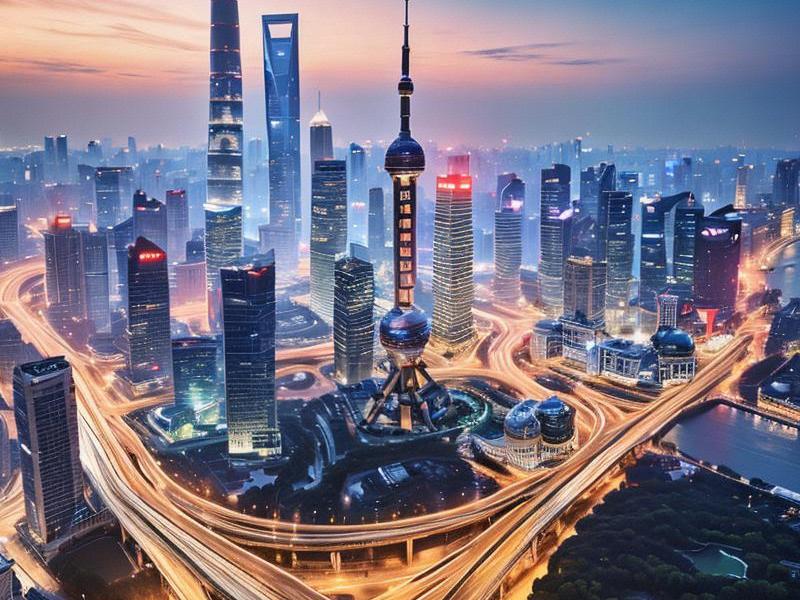This article delves into the multifaceted character of Shanghai, exploring its status as a global economic hub, a vibrant cultural center, and a city that is constantly evolving through innovation and urban development. Shanghai's unique blend of tradition and modernity makes it a fascinating subject for analysis.

Shanghai, known as the "Pearl of the Orient," stands as a beacon of China's economic and cultural resurgence. As one of the world's most dynamic cities, Shanghai embodies the spirit of modernity while preserving the rich heritage of its past. This article aims to provide an in-depth look at the various facets of Shanghai, highlighting its role as a global economic hub, a vibrant cultural center, and a city that is at the forefront of innovation and urban development.
Economic Powerhouse
Shanghai's economic prowess is a testament to its strategic location and forward-thinking policies. Situated at the mouth of the Yangtze River, the city serves as a critical gateway for trade between China and the rest of the world. Its well-developed infrastructure, including the world-class port of Shanghai, has made it the largest and busiest container port globally. The port not only facilitates the movement of goods but also serves as a symbol of Shanghai's integration into the global economy.
The city's financial district, known as Lujiazui, is home to some of the tallest skyscrapers in the world, including the iconic Oriental Pearl Tower and the Shanghai Tower. These architectural marvels house major financial institutions, multinational corporations, and technology companies, making Shanghai a key player in global finance and commerce. The city's stock exchange is one of the largest in Asia, attracting investors from around the world.
Shanghai's economic success is not limited to traditional industries such as manufacturing and trade. The city has also emerged as a leader in high-tech industries, including information technology, biotechnology, and green energy. The Zhangjiang Hi-Tech Park, often referred to as "China's Silicon Valley," is a hub for research and development, fostering innovation and entrepreneurship.
Cultural Melting Pot
爱上海419论坛
Beyond its economic achievements, Shanghai is renowned for its rich cultural tapestry. The city's history as a colonial port has left a lasting impact on its architecture, cuisine, and lifestyle. The Bund, a historic waterfront area, showcases a blend of colonial-era buildings and modern skyscrapers, offering a glimpse into the city's past and present. The French Concession, with its tree-lined streets and charming cafes, is another area that reflects Shanghai's colonial heritage.
Shanghai's cultural scene is vibrant and diverse. The city is home to numerous museums, theaters, and art galleries, including the Shanghai Museum, which houses an impressive collection of Chinese art, and the Shanghai Grand Theatre, a venue for opera, ballet, and classical music performances. The city also hosts international cultural festivals, such as the Shanghai International Film Festival and the Shanghai World Expo, attracting visitors from around the globe.
Culinary traditions play a significant role in Shanghai's cultural identity. The city is famous for its signature dishes, such as Xiaolongbao (soup dumplings), Shengjianbao (pan-fried dumplings), and Nanxiang Mantou (steamed buns). These delicacies are not only a source of pride for locals but also attract food enthusiasts from all over the world. The city's night markets and bustling food streets offer a culinary adventure, showcasing the diversity of flavors and cuisines.
Urban Development and Innovation
Shanghai's rapid urban development is a marvel of modern engineering and planning. The city has undergone a dramatic transformation over the past few decades, with new skyscrapers, highways, and public transportation systems reshaping its skyline and infrastructure. The Maglev train, which connects the city center to Pudong International Airport, is a testament to Shanghai's commitment to innovation and sustainability.
上海龙凤阿拉后花园
The city's green initiatives reflect its dedication to environmental sustainability. Shanghai has invested heavily in renewable energy, energy-efficient buildings, and public transportation systems. The city's extensive metro network, one of the largest in the world, provides a convenient and eco-friendly mode of travel for millions of residents and visitors.
Shanghai's focus on innovation extends beyond technology and infrastructure. The city has established itself as a center for education and research, with prestigious universities such as Fudan University and Tongji University attracting students and scholars from around the world. The city's research institutions and incubators foster innovation, driving economic growth and technological advancement.
Challenges and Opportunities
Despite its many achievements, Shanghai faces several challenges in its journey towards sustainable development. The rapid urbanization has led to issues such as traffic congestion, air pollution, and housing shortages. The city government has implemented various measures to address these challenges, including the expansion of public transportation, the promotion of green spaces, and the development of affordable housing.
Shanghai also faces the challenge of maintaining its cultural identity in the face of globalization. The influx of international influences has brought both opportunities and challenges for preserving the city's unique heritage. Efforts are being made to promote traditional arts and crafts, support local businesses, and celebrate the city's cultural diversity.
上海贵族宝贝sh1314
Looking ahead, Shanghai has immense potential for further growth and development. The city's strategic location, robust infrastructure, and innovative spirit position it as a key player in China's future. As the country continues to rise on the global stage, Shanghai is poised to play a pivotal role in shaping the future of Asia and the world.
Conclusion
Shanghai's story is one of resilience, innovation, and cultural richness. From its bustling financial district to its vibrant cultural scene, the city offers a unique blend of tradition and modernity. As Shanghai continues to evolve, it remains a symbol of China's aspirations and a testament to the power of urban development and cultural exchange.
In conclusion, Shanghai's journey from a colonial port to a global metropolis is a remarkable tale of transformation and success. The city's economic prowess, cultural vibrancy, and commitment to innovation make it a fascinating subject for analysis. As Shanghai looks to the future, it stands as a beacon of hope and opportunity, inspiring cities around the world to embrace change and strive for excellence.